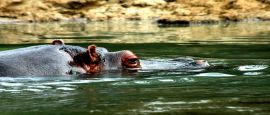Republic of Congo Food and Drink
Congolese cuisine incorporates French, Asian and Arabic influences into more starchy, traditional African fare. Local-style restaurants usually serve chicken, fish and goat dishes accompanied by some variation of a cassava or maize-based staple.
The major urban areas have a number of French-style bakeries and patisseries, many of which are run by Lebanese immigrants. Indian and Chinese restaurants are also not uncommon. However, often the best food and atmosphere is to be found at a simple open-air roadside grill.
In Pointe Noire, the Atlantic provides some excellent seafood, while Congo’s bountiful rivers and their freshwater fish are the main source of protein for many Congolese in the hinterland.
Manioc: Cassava root, usually prepared and served in dense, chewy cubes with meat or fish.
Fufu: A stiff porridge staple usually made with flour from cassava or maize.
Safou: A purple-skinned fruit that resembles a large olive, usually boiled and salted before eating, which gives the pulp a buttery texture.
Salt fish: A major source of protein for Congolese, a variety of salted and dried freshwater fish is found at most markets.
Saka Saka/Pondu: A rich local favourite made from a base of cassava leaves, palm oil and salt fish.
Goat stew: A traditional Congolese dish usually served with fufu or manioc.
Pili Pili: Spicy chilli sauce, served on the side of most Congolese dishes.
Plantains: A savoury banana that serves as a substitute for potatoes, best fried like chips.
Makobe: Freshwater fish seasoned with chilli and cooked in large marantacee leaves.
Palm wine: Fermented alcoholic beverage made from the sap of a wild palm tree.
Do you have any Feedback about this page?
© 2026 Columbus Travel Media Ltd. All rights reserved. No part of this site may be reproduced without our written permission, click here for information on Columbus Content Solutions.




 You know where
You know where